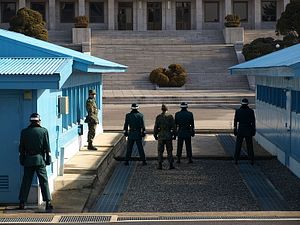For close observers of the Korean peninsula and northeast Asian security, 2017 was dispiriting.
North Korea flight-tested more than 20 ballistic missiles, introducing several kinds of new and advanced long-range ballistic missiles. They include two intercontinental ballistic missiles that can reach the U.S. carrying a nuclear payload.
They also carried out their sixth and most powerful nuclear test.
The first days of 2018, however, give cautious cause for optimism.
Following North Korean Supreme Leader Kim Jong-un’s new year offer to South Korea to discuss participation in the upcoming Winter Olympic Games in South Korea, inter-Korean diplomacy is set to resume for the first time since December 2015.
Early on Friday morning, North Korea notified South Korea’s unification ministry that it would send a representative for bilateral talks at Panmunjom in the heavily guarded demilitarised zone (DMZ), where the armistice ending the Korean War was signed and where most North-South interactions take place.
Pyongyang’s acceptance of South Korea’s overtures means diplomacy now has more momentum than at any time since since U.S. President Donald Trump took office.
Adding to the good vibes, shortly before North Korea’s acceptance of talks the U.S. announced that it had agreed to a South Korean request to delay the joint military Key Resolve and Foal Eagle exercises until the conclusion of the Paralympic Games on 18 March.
South Korea asked for the delay amid concerns North Korea would stage some kind of provocation during the Winter Olympics. The North has long said the springtime Foal Eagle exercises – which involve the mass mobilisation of troops and heavy military assets – are a ruse for preventive war.
All this suggests a calmer climate on the Korean Peninsula after a tempestuous 2017, but there remains cause for concern.
Although delaying military exercises may appear to be a U.S. concession, Pyongyang may demand more. During his new year address, Kim explicitly said that South Korea “should discontinue all the nuclear war drills they stage with outside forces.”
Kim may know this is asking too much, particularly given that his intercontinental ballistic missiles introduce the old Cold War specter of “decoupling,” whereby a direct threat to the U.S. could reduce its willingness to commit to defending South Korea.
But the North Korean leader may still not see a delay as sufficient cause for inter-Korean bonhomie.
Indeed, if his address suggested anything, it was that he senses he is in a position of strength after an incredibly successful year for his nuclear and ballistic missile programs. With all that leverage, North Korea may make heavy demands at the negotiating table next week.
Second, the focus next Tuesday at Panmunjom will be the participation of two North Korean figure skaters at the Winter Olympics. Concluding an agreement to facilitate their participation would no doubt make for a moment of inter-Korean closeness, but it is unclear where diplomacy might progress from there.
Even at this moment of optimism, we must ask if we have already reached the high point for diplomacy on the Korean peninsula in 2018.
Should the Panmunjom talks succeed, we may see a geopolitically uneventful Winter Olympics, but North Korea may return to testing ballistic missiles as early as late March, as the US-South Korea exercises begin.
For diplomacy to succeed in 2018, the U.S. and South Korea will have to extend this brief window of opportunity. Unfortunately, Seoul and Washington will remain divided on the correct path ahead.
While South Korean President Moon Jae-in has long been disposed toward engagement with the North, the Trump administration may see no alternative to doubling down on its policy of “maximum pressure,” refusing to cede an inch.
Potentially fatal to a springtime détente would be continued mixed messaging and boorish rhetoric from the U.S. president.
Trump has bragged about the size of his “nuclear button” compared with Kim’s and also applauded the inter-Korean talks as a positive development.
With the Trump administration a year into office and senior Asia roles within the U.S. foreign policy bureaucracy slowly being filled, Washington must be ready to stand alongside Seoul as it approaches North Korea without losing sight of its long-term objective of denuclearising the Korean peninsula.
In 2017, Moon showed remarkable pragmatism in approaching North Korea alongside Washington and now it is time for the U.S. to play a similar role.
Should the allies themselves find little common ground, it is more likely than not that this moment of diplomatic optimism on the peninsula will be fleeting.
A version of this article first appeared at the BBC and is republished here with kind permission. For breaking news stories from around the globe and in depth analysis from BBC World News, please visit bbc.com/news.

































